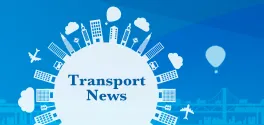Mark Frost's last message as Chair of TPS
So, two years has flown by and I find myself penning my last message to TPS members as Chair.
It’s been a genuinely fascinating couple of years for me leading what is a really a very remarkable organisation, particularly as it is driven almost wholly by volunteer time and graft.
Over the course of the last 24 months I have come to realise that a distinguishing mark of transport planners is that we like to reach out and speak to each other, and indeed colleagues from a wide range of different sectors and professions. As my TPS board colleague Jim Morey memorably wrote in 2021 in a blog for us:
Transport planners sit in the middle of a vast ‘Venn diagram’ of overlapping skills, disciplines and interests in the planning, transport, highways and other sectors. We are like ringmasters in a circus, charged with bringing all these elements together. It is up to us to ensure that the complex, diverse needs of all people are considered. Doing so will require user engagement, often with people who are hard to reach - and occasionally with those whose views will challenge us.
TPS is hardwired to support this of course, our founding mission being:
A society to facilitate, develop and promote best practice and innovation in transport planning and provide a focus for dialogue between all those engaged in it whatever their background.
However, I think the critical challenges of the coming decades for the sector mean that we need to continue to push this collaborative approach in ever more innovative ways.
As an example, many transport planners will be bemused if not shocked by the events in Oxford over the course of the last few months. The application of trial approaches to managing vehicular traffic, tailored wherever possible using new technology and enforcement techniques to reduce impact on residents, have been attacked from commentators as diverse as Right Said Fred to Piers Corbyn as both anti-democratic and as part of some sort of conspiracy by the establishment to constrain citizens freedoms and trap them in 15 minute ‘cells’.
There is always resistance to change of course, and there is no doubt that some users will be genuinely impacted by these proposals, and some will have difficulty changing their personal behaviour in response, despite the best attempts by the council to offer flexibility. However, the speed at which the craft of our sector has become subsumed into some sort of wider culture war driven sometimes by shadowy half-facts pulled from the fringes of the internet and the social media platforms is quite staggering.
It is not enough for transport planners to therefore rely on their long established professional expertise in the deployment of models, business cases, engineering solutions and technology to deliver our programmes - we need to be far more adept at engaging and communicating with the public around the need for change and the benefits that may accrue from it.
Psychologists, traditional and digital marketing professionals, pollsters and political scientists, behaviour change specialists from the public health sector, community mobilisers and those schooled in conflict resolution – all of these professionals offer valuable insight into how we can implement transport projects and policies successfully. We are really in the foothills of the net-zero mountain here, with far more difficult challenges ahead of us as we look to decarbonise the sector. As Professor Greg Marsden has recently made clear from his analysis of the data underpinning the DfT's Transport Decarbonisation Plan, it isn’t credible that technology can deliver the emission reductions required alone – behaviour change is key and this is really the most difficult challenge we as a sector now face. Looking forward I hope that the Society is able to do even more to bring in these voices into the discussion in coming years and so help further inform our practice.
TPS update
Since my last message in December we’ve been busy getting ready for our AGM on 9 March, and ensuring that we have a smooth handover to a new chair.
I was really pleased to have been inundated with applications to join our board this year. With a bumper six spaces up for grabs it is always a slightly nervous moment for the sitting chair in case we end up not being able to fill all of those roles... As it happened, we had 15 very strong names put forward (a new record) - a good balance of people (like me) looking to stand again, alongside lots of new names looking to get engaged with the society for the first time. I was particularly happy to see past TPS burarsians putting their names forward again suggesting this initiative is providing a good pipeline of talent into the Society amongst younger transport planners. Please don’t forget to vote before the deadline of 5pm on 7 March.
We’ve already held a few webinars in 2023, either directly or in partnership with supporting institutions. You can always catch up via our YouTube channel: Transport Planning Society - YouTube
I was particularly pleased to be back in person at Steer’s lovely new offices in Southwark for the first in our series of Stakeholder events for 2023. Steer set a high bar here for others to follow with a session exploring key developments in the sector for the coming years, with presentations from Jessica Matthew (Co-Director, Local Transport at DfT), Victoria Hills (Chief Executive of RTPI) and Matthew Clark (Associate Director at Steer and Chair of COMO). Watch our joint event with Steer on 'Shaping the future of transport planning' (tps.org.uk)
We’ve also kicked off our blog series for this year with a summary of follow up questions to David Metz’s interview with us from last year (which you can see here: Good to Go? Decarbonising Travel After the Pandemic - YouTube). I found this a particularly interesting and timely discussion, touching as it does 15 minute cities, low traffic neighbourhoods, road user charging, regulating digital navigation and kerbside strategies. Well worth a read, and also don’t forget TPS members get 30% off David’s new book – more detail here: Read new blog from David Metz answering questions from his book launch: ‘Good to Go: Decarbonising Travel After the Pandemic’ (tps.org.uk)
I was delighted that, through the hardwork of our membership group, a long awaited video aimed at people interested in joining our industry has now been released. Watch a video from our members on why you should become a Transport Planner and join TPS. It’s really encouraging to see the genuine enthusiasm for the sector (and the Society) on show from such a wide and diverse range of TPS members.
I do hope to see as many of you as possible at the AGM on the evening of 9 March at 6pm. You should have received an email from our excellent committee support officer Katherine Coldwell with a link, if not please do email info@tps.org.uk.
As I finish my time as Chair I’d like to offer thanks to all those who have supported me along the way - especially my fellow Directors, and the JFG and ICE teams who support us. A particular shout out to Kate Morris our current hard working company secretary who is standing down after 6 years hard graft – quite the stretch! Alongside the board, we also have ongoing help from long standing supporters of the society – people like Jo Ward who has run our Bursary for many years now even after standing down as a board member, and past chairs such as Glenn Lyons, Martin Tugwell or Victoria Hills who have happily given their time to help us at events. I’ve also particularly enjoyed my many conversations with Peter Stonham at LTT, probably one of the Society’s longest serving cheerleaders (and helpfully one happy to challenge us when we get things wrong!).
It’s pleasing to know I’ll be passing on the Society in good shape to an excellent new incoming chair – looking forward to the next chapter of the TPS story!














